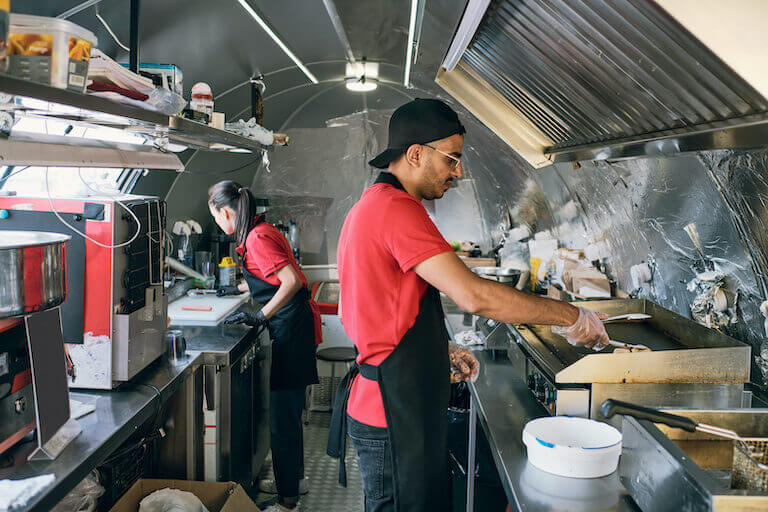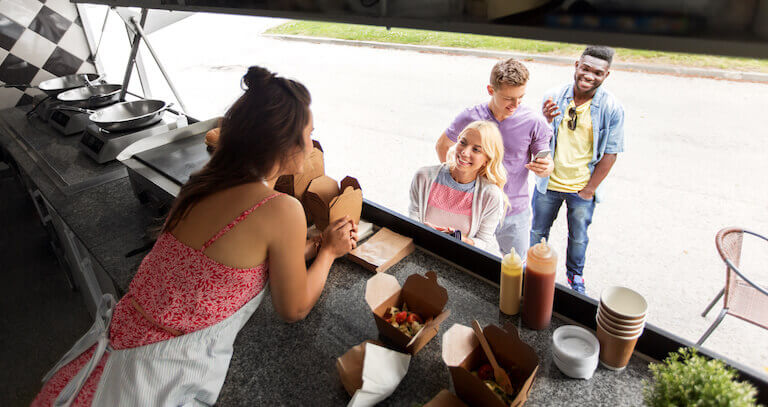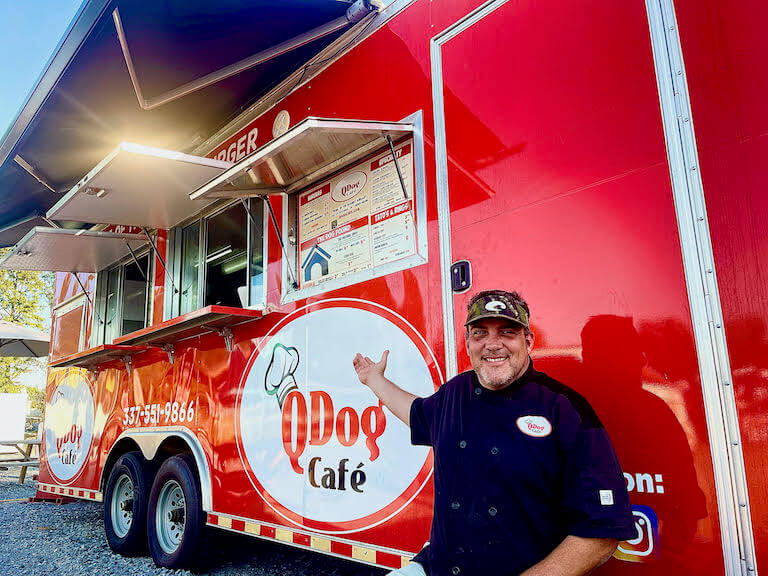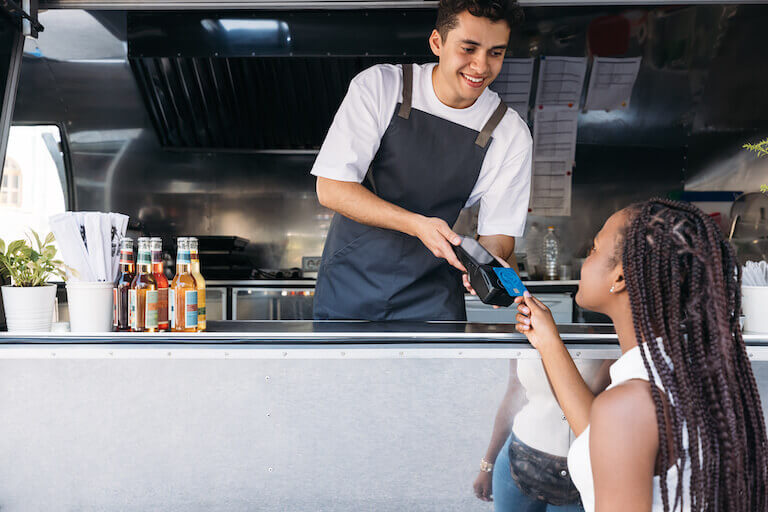Listen to This Article:
It’s lunchtime, so you head out to the food truck park nearby. There are five trucks there, and each has a substantial line out front.
You opt for the taco truck (your favorite), and order one barbacoa and one bistec taco. As you sit at the picnic table to feast, you can’t help but wonder…how much money does a food truck make? After all, as a culinarian, you’ve toyed with the idea of starting your own truck one day.
While there’s no simple answer to this question, we aim to demystify the food truck financials. So here’s how much a food truck could make.
How Much Can a Food Truck Make Per Day, Per Month, and Per Year?**
How much money an average food truck can make depends on the price of the menu, the market, and how busy the truck gets.
One source says that food trucks can make an average revenue of $250,000 to $500,000 annually.*** That breaks down to $20,000 to $42,000 per month, or $667 to $1,400 per day. But a 2017 survey by Food Truck Empire found that about 50% of trucks made $150,000 or more in revenue per year, 45% made $50,000 to $149,999, and just over 3% made less than $50,000 per year.
A large truck with greater output capacity and a more expensive menu in a popular area with plenty of foot traffic could earn much more than a small truck in a smaller city with a low-cost menu. But keep in mind—that smaller truck will also have lower expenses!

The large interior of this food truck means it has the potential for greater food output and higher revenue.
The day-to-day income of a food truck can also be highly variable. Daily sales could see spikes when there are special events in the area, or peaks and dips based on seasonality. And since food truck customers are exposed to the elements, bad weather could hurt sales. If people are staying home, working with a third party delivery service could help offset those bad days.
How Much Can It Cost to Start a Food Truck?
Your startup costs should be planned with your sales forecast in mind. Don’t borrow more money to start your truck than you can reasonably expect to repay!
It can cost anywhere from $40,000 to $250,000 to start your own food truck. Find out where that money goes in our article about food truck costs!***
How to Forecast Your Sales
With such a wide range of revenue averages, a food truck operator has to forecast their sales as accurately as possible so they know what they can afford during startup.
Once your business is established, your forecasts will be based on past data. But when your business is new and you have no data to work from, you can use these tactics to make an educated guess.
Calculate The Maximum Number of Customers You Could Serve in a Day
Start by figuring out how many customers you could possibly serve in a day, based on your proposed staff levels, the space in your truck, and how long it will take to execute a single order.
This will give you a maximum amount for your daily sales. But you won’t reach that maximum most days. So how can you make a more accurate estimate?
Do Street-Level Competitor Research
Try a bit of guerilla competitor research. Identify a few food trucks that you consider similar to yours in price point and ideal customer. Then sit, watch, and count. How many customers do they get during the lunch rush? During the dinner hour? Mid-afternoon? Late night?
Do this for a few different trucks to help you come up with the average number of customers you can expect per day. Of course, your goal will be to outdo them all and get closer to that maximum possible sales number with fantastic food and great marketing!
When you know how many customers these trucks have in an average day, you can apply this approximate number to your own menu to make a guess at your sales. This can help you create a smart start-up plan, keeping costs appropriate for your expected level of income.

Count the number of customers at competitor trucks to get an idea for how many you could expect at your truck!
How Much Can Food Truck Owners Make?
According to Toast, nationally, food truck owners make between $24,000 and $153,000 per year.*** Salaries for truck owners depend on the truck’s revenue, expenses, and profitability.
It’s important to keep some of the truck’s profits on hand to reinvest in the business or to put in a contingency fund for expenses and repairs. For that reason, the owner’s salary for a food truck is usually less than 50% of the profits.
An Example Revenue & Cost Breakdown For an Average Food Truck
- Food Truck Annual Revenue: $400,000***
- Food Truck Annual Expenses: $297,852
- Permits, Insurance, Parking: $15,000***
- Commissary Kitchen Rental: $12,000***
- Utilities & POS Expenses: $15,000***
- Food Costs: $120,000 (30% of sales)***
- Labor Costs: $120,000 (30% of sales)***
- Loan Repayment (for a $100,000 loan, 10% interest): $15,852***
Total Profit (Revenue – Expenses): $102,148
Owner’s Salary: Estimated at $50,000 to keep 50% of profits in the business

Food truck owners can make a good salary, but they have to save profits to reinvest into the business as well. Escoffier graduate Quinten Adcock reinvested wisely so he could upgrade his food truck.
Are Food Trucks Profitable?
They can be! If they weren’t, there wouldn’t be so many. But with any business, profitability comes down to keeping startup and operating costs in check.
Instead of buying a brand-new food truck with all the bells and whistles, consider starting your business with a used food truck. A second-hand truck could go for half the price of a brand-new one. You could also rent your truck instead of buying when you first start out. Save up your profits for a future truck purchase so you may not have to borrow as much.
Pay close attention to food and labor costs, which together can eat up 50% to 70% of your revenue. If you let these costs get out of control, you can lose any hope of profitability. You can cut labor costs by taking more shifts yourself. It’s a labor of love!
Also keep an eye out for deals. A new food truck POS company may offer competitive rates to try to lure you away from your current service provider. Have the conversation! You’ll pay a percentage of every transaction to your POS company, so any discount could really add up.

Keeping costs low can help your truck be more profitable.
Keep Revenue and Expenses Balanced for a Profitable Food Truck!
Spreadsheets, cost analyses, and sales forecasts aren’t the most exciting parts of running your own food truck. But they are among the most important. If you don’t carefully manage costs, your food truck could lose money instead of making it. And if that happens, you won’t have your food truck for long.
To start your business strong, you’ll need a solid business plan. That’s one of the concepts that students may visit in Escoffier’s Culinary Entrepreneurship course, which is part of the curriculum for Food Entrepreneurship students.
“I’m a graduate of Auguste Escoffier School of Culinary Arts. The instructors…truly care about you as a student and as a person. I opened a food truck while enrolled and the long hours had me falling behind in my classes. My instructor called me personally and we worked on balancing the schoolwork with my work schedule AND she helped me with great advice for my business. If you’re thinking about culinary school–DO IT!!!”*
Quinten Adcock, Escoffier Graduate
With coursework in hospitality marketing and social media, cost control, menu design, inventory management, and more, these programs may help the future food truck owner to create a more profitable, long-term business. Contact us today to find out more!
To learn more about starting your own food business, try these articles next:
- How to Start a Restaurant With Little to No Money
- How to Build a Delivery-Friendly Menu
- How Much Does It Cost to Start a Restaurant?
*This information may not reflect every student’s experience. Results and outcomes may be based on several factors such as geographical region or previous experience.
**Figures are estimates based on industry trends and standards. Actual figures may vary by geographic region.
***Please use the hyperlinks embedded in this article that provide the relevant source data.

